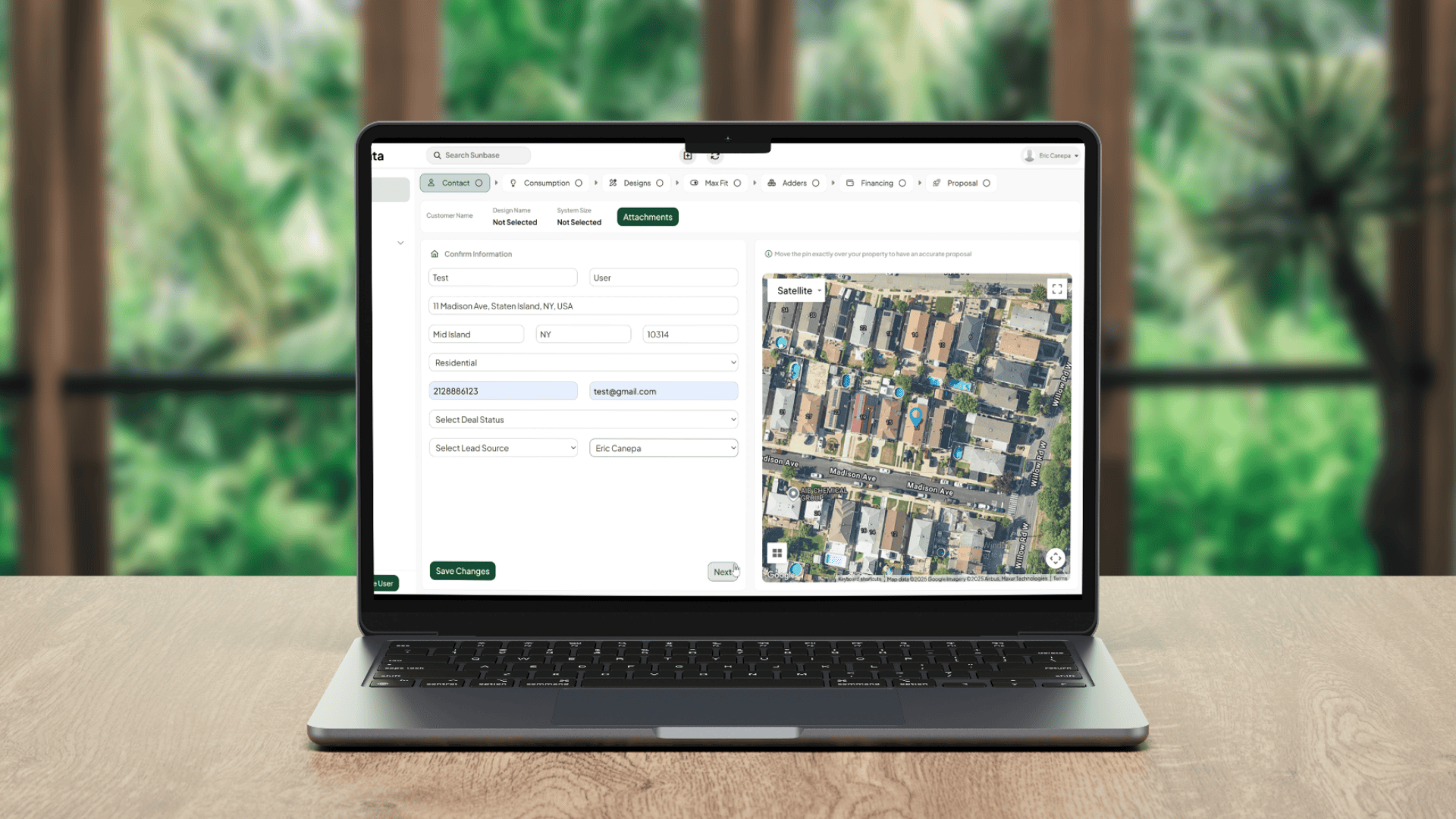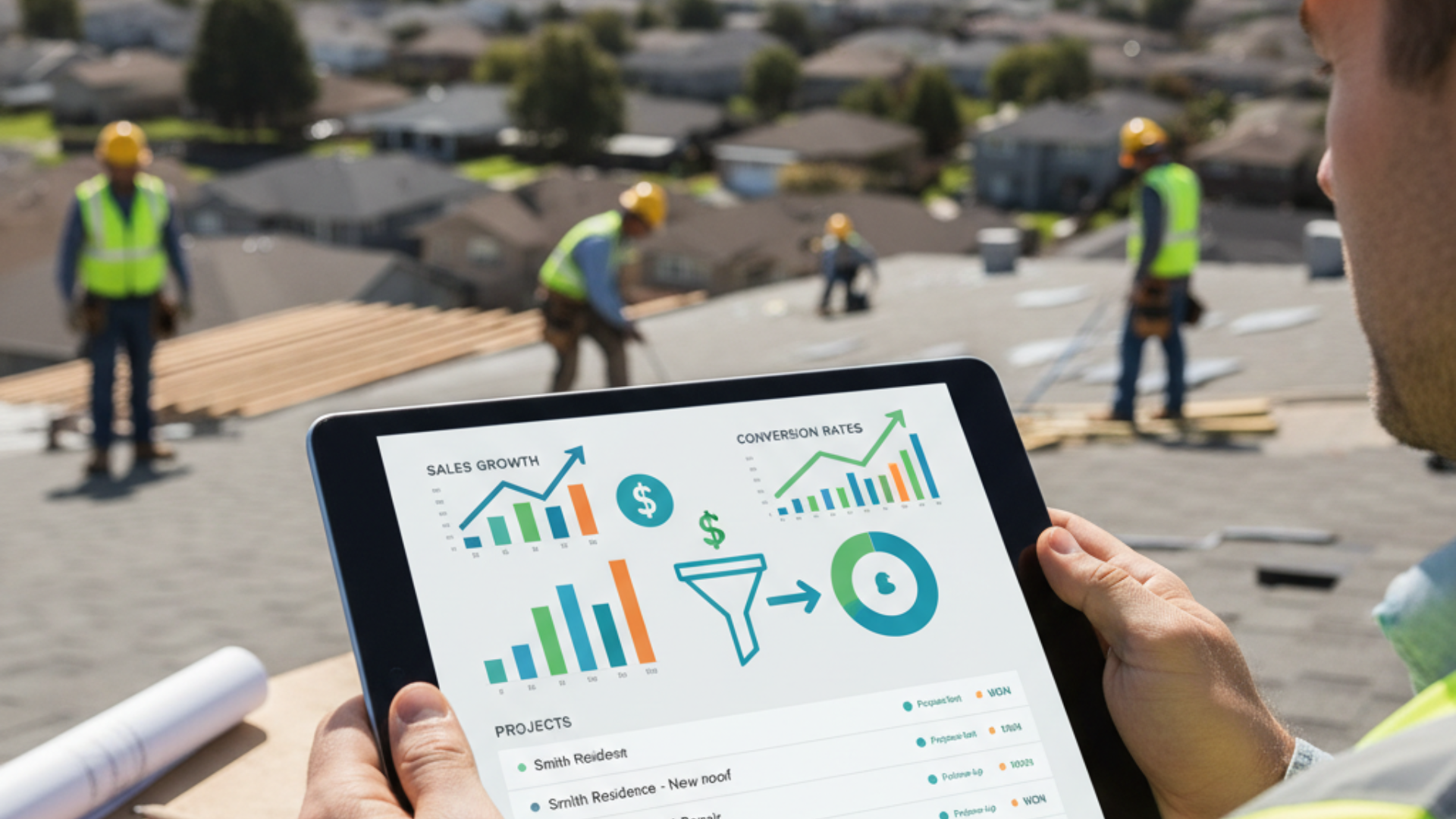June 12, 2025
Audio Overview: Listen & Learn
Let’s begin with a question: What does it take to transform sunlight into success?
If you work in the solar industry, you understand that the answer goes beyond panels and inverters. It involves managing intricate projects with meticulous attention to detail, all while dealing with permits, stakeholders, and strict deadlines. Truth: spreadsheets and sticky notes are no longer sufficient.
And that's where solar project management software can help transform disorganized workflows into efficient and profitable operations.
Let's explore the essential tools, common mistakes, and how to avoid them, along with real-world examples that demonstrate how efficient management enhances return on investment (ROI) in solar.
Key Takeaways
- Effective solar project management is crucial for navigating unique challenges and ensuring profitability.
- Utilizing specialized tools for planning, communication, finance, and site management is essential.
- Avoiding common mistakes, such as poor planning, ineffective communication, and inadequate risk management, is vital for success.
- Strategic project management, potentially aided by integrated platforms like Sunbase, drives higher returns on investment (ROI) and client satisfaction.
Understanding the Solar Project Lifecycle and Its Complexities

A solar project progresses through distinct stages, each with specific challenges.
1. Key Stages of a Solar Project
Stages include development, financing, engineering, procurement, construction, commissioning, and operation & maintenance (O&M).
2. Unique Challenges in Each Stage
Challenges encompass permitting delays, supply chain disruptions, installation complexities, and grid interconnection issues.
3. How Effective Management Mitigates Risks and Ensures Success?
Effective management proactively identifies risks, develops mitigation strategies, and maintains clear communication, thereby minimizing delays, controlling costs, and ensuring the successful completion of projects.
Utilizing platforms that provide visibility across all stages streamlines operations and reduces errors. An all-in-one management software, such as Sunbase, can offer this end-to-end visibility.
Essential Tools for Successful Solar Project Management
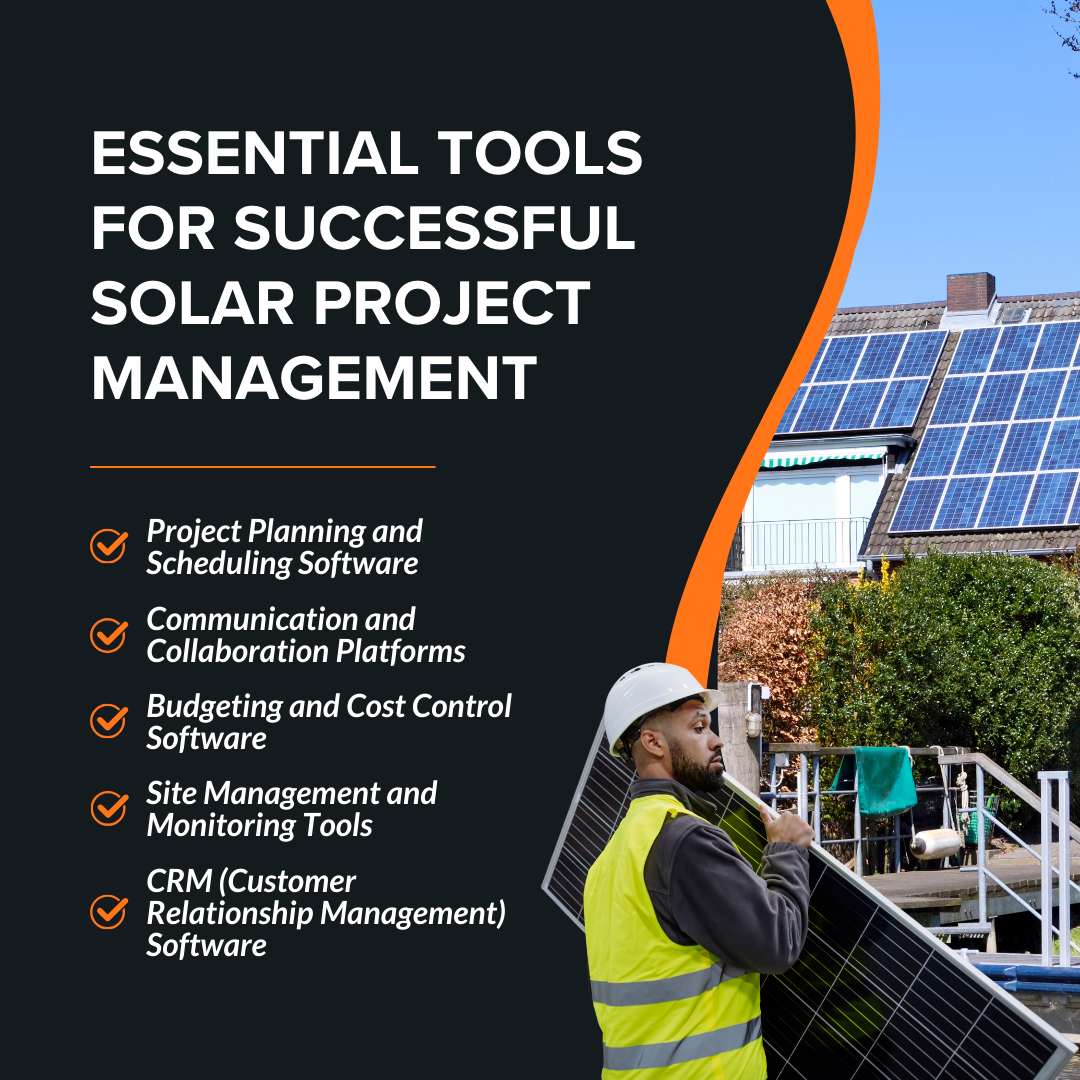
Utilizing tools like Sunbase effectively improves the way you manage solar projects.
A. Project Planning and Scheduling Software
Tools featuring Gantt charts, CPM analysis, and resource allocation are essential for developing timelines and managing task dependencies. Integrated platforms typically offer these features.
B. Communication and Collaboration Platforms
Platforms like Slack, Microsoft Teams, and Google Workspace facilitate real-time communication and document sharing among teams and stakeholders. Smooth communication within a project management system boosts your efficiency!
C. Budgeting and Cost Control Software
Software for tracking expenses, invoices, forecasting, and ROI analysis is essential for financial control. Platforms that integrate financial management with project tracking offer better visibility and real-time cost analysis.
D. Site Management and Monitoring Tools
Tools like drones for surveys and specialized monitoring platforms track progress, quality, and performance on-site. Integrating this data provides a unified view of the project. A platform that can consolidate this site's data is beneficial.
E. CRM (Customer Relationship Management) Software
CRM manages client interactions, tracks leads, and stores client and project information. A CRM tracking project milestones and client communications improves satisfaction and streamlines handoffs from sales to project execution.
Platforms offering integrated CRM capabilities alongside project management, potentially like Sunbase, can provide a seamless client journey.
Discover Why More EPCs Are Choosing Comprehensive Solar Management Software
Common Mistakes to Avoid in Solar Project Management
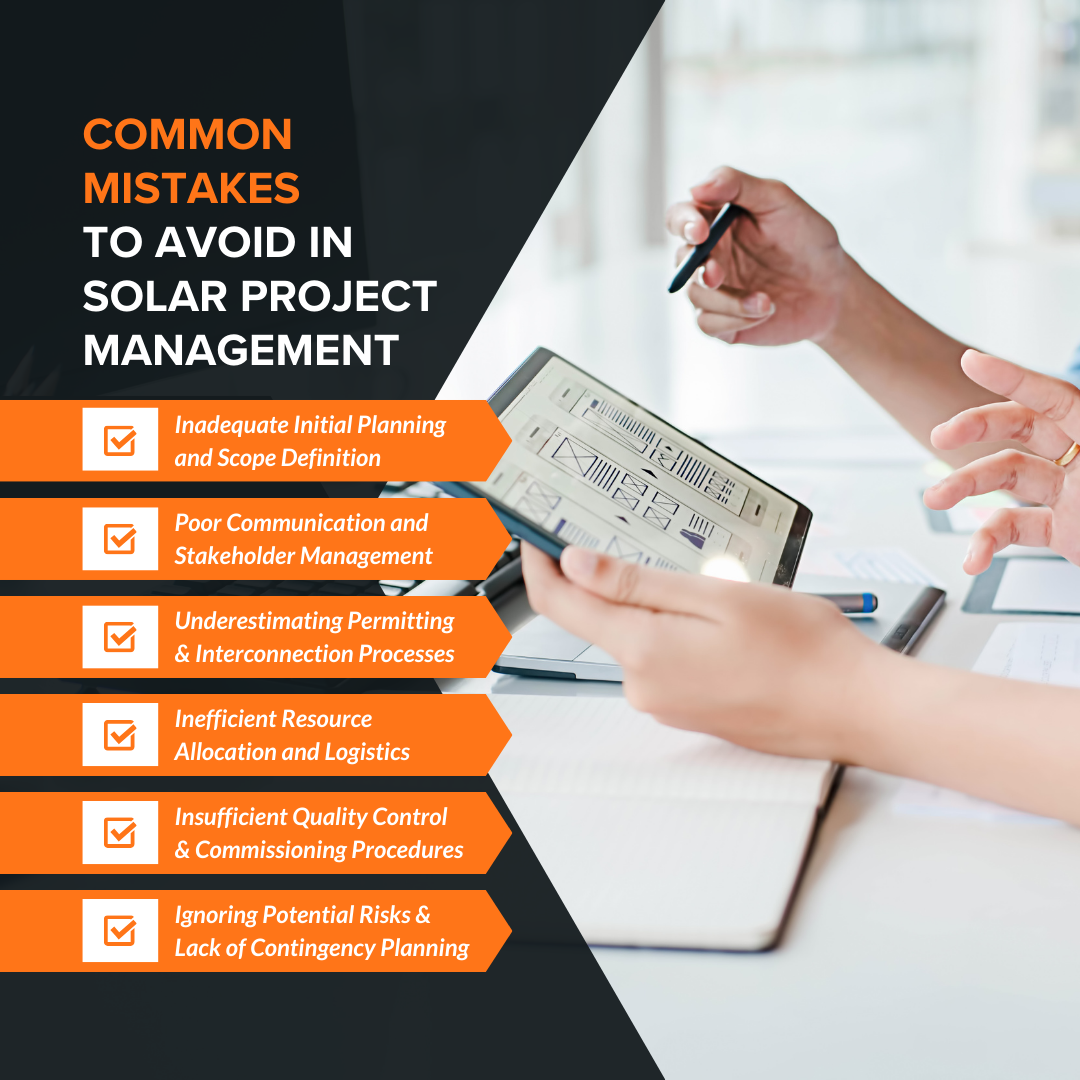
Every minor mistake can significantly impact the success of a solar project.
A. Inadequate Initial Planning and Scope Definition
Inadequate planning from the outset can result in scope creep, delays, and budget issues.
That’s why detailed planning is so important! Using comprehensive project management platforms can make a big difference. These tools help you define the scope clearly and plan resources effectively.
B. Poor Communication and Stakeholder Management
When communication is unclear and inconsistent, it can lead to misunderstandings and delays, which can be frustrating for everyone involved.
That's why using integrated communication tools within a project management system is so helpful; they ensure that everyone stays informed and aligned, making the process smoother!
C. Underestimating Permitting and Interconnection Processes
Navigating these administrative processes can be quite a challenge and often takes more time than expected.
When overlooked, it can have a significant impact on both timelines and budgets. Using tools to track progress, manage permitting milestones, and handle necessary documentation can effectively reduce this risk.
D. Inefficient Resource Allocation and Logistics
When labor, materials, and solar equipment aren't planned well, it can lead to some expensive logistical challenges.
That's where effective resource management tools in software can assist you with scheduling and tracking, allowing things to run more smoothly.
E. Insufficient Quality Control and Commissioning Procedures
When you skip quality checks, we not only risk facing performance issues but also unintentionally introduce safety hazards.
By setting standardized checklists and protocols within our project management system, you can ensure that our quality standards are consistently met and upheld, thereby creating a safer and more effective work
environment.
F. Ignoring Potential Risks and Lack of Contingency Planning
Failing to identify and prepare for risks can significantly expose projects to unexpected challenges.
However, platforms equipped with risk management features help stay ahead by supporting proactive planning and developing effective contingency plans.
ROI Case Studies Through Effective Solar Project Management
Case Study 1: Community Solar Project
- Challenge: Coordinating multiple stakeholders (landowners, investors, utilities).
- Solution: Utilized collaboration platforms and held regular meetings for smooth communication and alignment, resulting in successful completion and community buy-in.
- Quantifiable ROI: Achieved social impact and positive community relations, attracting future investment and demonstrating ROI beyond mere financial gains.
Case Study 2: Off-Grid Solar System for Remote Location
- Challenge: Logistical hurdles for transport and installation in a remote area.
- Solution: Implemented detailed planning and site management tools (drones, inventory software) for a successful installation despite logistics.
- Quantifiable ROI: Delivered reliable, cost-effective power, eliminating expensive alternatives and demonstrating ROI through long-term savings and energy independence.
Here's how you can maximize ROI using All-in-One Solar Software.
Choosing the Right Solar Project Management Tools
Choosing the right solar software for project managers significantly impacts both project efficiency and outcomes.
Key Features to Look For:
- Focus on solar-specific features, scalability, strong reporting, and software integration.
- Look for platforms that cover the entire project lifecycle, including financial and client management, like Sunbase, which aims for comprehensive coverage.
- Evaluate tools based on project planning, financial management, communication, and site tracking capabilities.
- Integrated solutions that encompass the entire lifecycle are becoming increasingly important.
- When considering options, look for platforms specifically designed to meet the needs of the solar industry.
Discover the Key features to consider when choosing solar software.
Implementing Effective Solar Project Management Practices

Tools are most effective when supported by sound project management practices.
A. Establishing Clear Roles and Responsibilities
Define clear roles and responsibilities for solar professionals and stakeholders to ensure accountability and streamline decision-making.
B. Developing Standardized Processes and Workflows
Implement standardized processes for recurring tasks to improve efficiency and consistency across projects. Document these workflows within your system.
C. Regular Progress Monitoring and Reporting
Monitor progress against timelines and budgets on a regular basis to ensure adherence to established goals.
Real-time tracking and reporting keep stakeholders informed, allowing for timely intervention.
D. Proactive Risk Management and Mitigation Strategies
Identify potential risks early and develop proactive mitigation strategies to reduce their impact. Integrate risk assessment into your planning.
E. Continuous Improvement and Lessons Learned
Review completed projects to identify successes and areas for improvement within the sales team. Document lessons learned to foster continuous improvement in future projects.
The Future of Solar Project Management: Technology and Innovation

The field is evolving in response to technological advancements.
1. Integration of IoT and Sensor Data for Real-Time Monitoring
IoT and sensors provide real-time performance data, allowing proactive maintenance and optimization. This data can be integrated into management platforms.
2. Use of AI and Machine Learning for Predictive Analytics
AI/ML can analyze data to predict delays or equipment failures, enabling preventative action and informing scheduling.
3. Digital Twins for Project Visualization and Simulation
Virtual replicas allow visualization, simulation, and optimization of design and construction processes.
4. Blockchain for Supply Chain Transparency and Security
Blockchain can enhance supply chain transparency and security by tracking components and providing reliable information for project management.
Conclusion
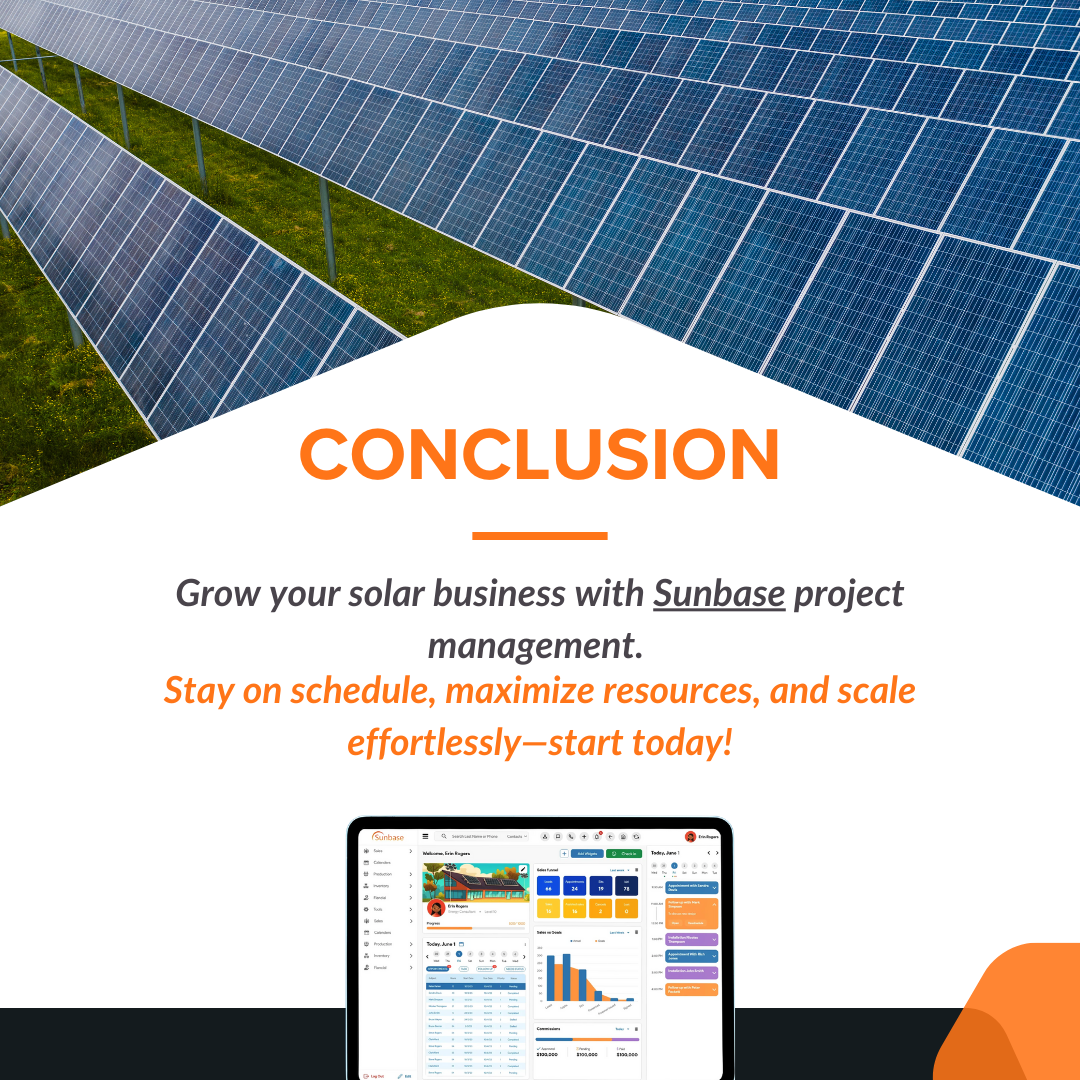
Effective project management serves as a strategic approach for solar companies to enhance their return on investment (ROI).
Effectively overseeing processes from lead to operation boosts profitability.
Utilizing a platform like Sunbase, which combines these elements, can be highly beneficial in the long run.
More About Sunbase
It's time to upgrade! Grow your solar business with Sunbase Project Management Software.
Stay on schedule, maximize resources, and scale effortlessly. Start today, contact us here!
FAQs
1. What are the biggest challenges in solar project management?
The biggest challenges in solar project management include securing permits, managing the supply chain, coordinating with stakeholders, addressing weather-related issues, and allocating resources in remote areas.
2. How can project management software specifically help with solar projects?
It provides tools for site data, project documentation, equipment tracking, weather-influenced timelines, stakeholder communication, and financial analysis and monitoring, all tailored to the solar industry.
3. What is a good return on investment (ROI) to aim for in solar projects?
Varies by project, location, and financing, but aims for competitive returns considering long-term revenue. Effective management impacts ROI by controlling costs.
4. What are some key performance indicators (KPIs) for solar project management?
Key Performance Indicators (KPIs) for solar project management include on-time completion, budget adherence, customer satisfaction, energy production, safety rate, and return on investment (ROI).
One Platform. Zero Chaos. Run Your Entire Business in One Place.
Sunbase replaces your CRM, proposals, scheduling, job tracking, and reporting tools — all inside one clean, connected platform.
About Sunbase
The All-In-One Platform to Run Your Entire Business
Sunbase helps you organize operations, streamline daily workflows, and manage everything - from first customer contact to final project deliver- in one connected system.
Our Mission
- Organize your business.
- Optimize your workflow.
- Automate what slows you down.
Why Businesses Choose Sunbase
One Connected Workflow
Replace scattered tools and manual processes with a single platform that brings together your team, tasks, customers, jobs, and performance data.
🌎 Global Presence
Serving the United States, Canada, India, LATAM, Australia, and 10+ international markets.
👥 11,000+ Users
Trusted by contractors, installers, project managers, sales teams, and field technicians.
🏗️ Built for All Sizes
From small contracting teams to fast-growing enterprises, Sunbase adapts to your workflow.
Useful Links For You
Stop Managing Your Business Manually. Automate It.
Sunbase automates workflows, reduces mistakes, and helps your team get more done - without hiring extra staff or juggling multiple tools.



